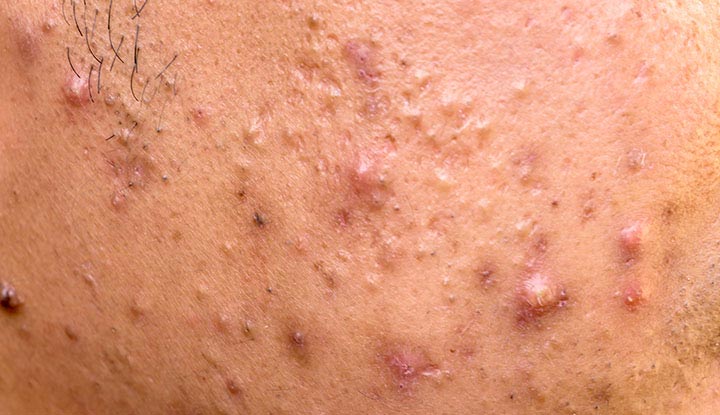Acne papules are small, inflamed bumps caused by excess oil in your skin, bacteria, hormones and some medications. They don’t have a pus-filled tip like other forms of acne. Treatments include over-the-counter and prescription medications.
Advertisement
Cleveland Clinic is a non-profit academic medical center. Advertising on our site helps support our mission. We do not endorse non-Cleveland Clinic products or services. Policy

Image content: This image is available to view online.
View image online (https://my.clevelandclinic.org/-/scassets/images/org/health/articles/22905-acne-papules)
Acne papules are solid, inflamed bumps in your skin that are usually cone-shaped (conical). They don’t have a white or yellow pus-filled tip. They’re usually smaller than one centimeter (cm), and they may be the same color as your skin or red, brown or purple.
Advertisement
Cleveland Clinic is a non-profit academic medical center. Advertising on our site helps support our mission. We do not endorse non-Cleveland Clinic products or services. Policy
Papules typically affect teenagers (adolescents) and young adults undergoing hormonal changes. But many adults continue having papules into their 20s, 30s and beyond. Some even develop papules for the first time as adults.
Acne papules are very common. Some researchers suggest that acne papules affect nearly everyone at some time during their lives. They’re most common during adolescence, but adults may have them, too.
Your face (especially your nose, chin and forehead), neck, back, chest, shoulders and upper arms are most likely to develop papules. But they may appear on other parts of your body, as well.
Papules are an inflammatory form of acne. They don’t have a pus-filled tip, but they’re still noticeable. They may be red, tender, painful or irritating.
Acne papules have many causes:
Advertisement
Papules aren’t contagious. You can’t spread them to another person through skin-to-skin contact.
Acne papules are easy to recognize visually, so you don’t necessarily need a healthcare professional to diagnose them. However, your healthcare provider can diagnose and help treat acne papules during a skin exam.
They may ask if you’re undergoing significant stress or if you have a family history of papules, which are risk factors. If you menstruate, your healthcare provider may ask about your menstrual cycles, as the appearance of acne papules is sometimes related and may flare with your menstrual cycles.
If you have severe papules, see a dermatologist for treatment. Dermatologists are doctors who specialize in conditions that affect your skin, hair and nails.
Nonprescription medications can get rid of milder cases of papules. Some medications include:
If your acne papules don’t go away with nonprescription medications, your healthcare provider may recommend the following prescription medications:
Several home remedies may help treat acne papules.
While home remedies are safe for most people, it’s a good idea to check with your healthcare provider before trying some of the following options. You may be at risk of developing an allergic reaction.
Some home remedies include:
Advertisement
When acne papules cause a lot of pressure under your skin, you may want to squeeze them. However, it would be best if you didn’t squeeze your papules. There isn’t any pus to remove, and squeezing can several problems:
Most acne papules go away on their own, but it may take some time — usually between three and seven days, though it may take up to several weeks.
If you have papules, be careful managing them to avoid irritation. The following will help you avoid irritating your papules:
Papules often go away in early adulthood, though some people will continue experiencing them throughout their lives. Your healthcare provider, medical aesthetician or dermatologist can help you manage your acne papules.
Advertisement
Preventing papules is difficult, if not impossible, during normal hormonal changes. But the following tips might help:
See your healthcare provider as soon as you notice acne papules to start treatment immediately.
Acne papules are solid, inflamed bumps in your skin that don’t have a white or yellow pus-filled tip. Pustules have a white or yellow pus-filled tip.
Papules can develop into pustules.
Nodules are a more severe form of acne than papules. They’re larger and more likely to be painful.
Papules are a form of acne. Macules are smooth areas of discoloration that appear on a person’s skin that may be from a variety of causes.
Acne papules are a common skin condition that affects most people, especially teenagers. Because they mainly affect teenagers, many people think that papules are part of the transition from childhood to adulthood and don’t see a healthcare provider about them. But a dermatologist can help treat your acne papules and limit any long-term damage to your skin.
Advertisement

Sign up for our Health Essentials emails for expert guidance on nutrition, fitness, sleep, skin care and more.
Learn more about the Health Library and our editorial process.
Cleveland Clinic’s health articles are based on evidence-backed information and review by medical professionals to ensure accuracy, reliability and up-to-date clinical standards.
Cleveland Clinic’s health articles are based on evidence-backed information and review by medical professionals to ensure accuracy, reliability and up-to-date clinical standards.
Cleveland Clinic’s primary care providers offer lifelong medical care. From sinus infections and high blood pressure to preventive screening, we’re here for you.
